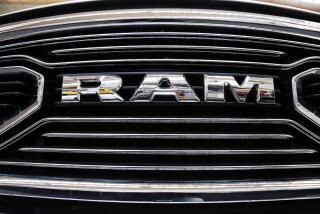Activists Seek Reforms to Aid Used-Car Buyers
No one alerted Dan Chaisayant that the used 1989 Dodge Daytona had a long history of mechanical problems when he bought it from a San Jose Chrysler dealer in 1992.
He found out about the car two years too late, when the California Department of Motor Vehicles in 1994 charged Chrysler with selling 119 lemons to used-car buyers without disclosing previous problems with the vehicles.
In the wake of California’s long-running case against Chrysler, which resulted in the DMV ordering sanctions against the auto maker Oct. 19, consumer activists are calling for reforms that would make it easier for used-car buyers like Chaisayant to get information about lemons--problem cars and trucks that have been repurchased by manufacturers.
They are lobbying the Federal Trade Commission for a national lemon registry that would make vehicle information available to used-car buyers, possibly through use of an 800 number.
Activists say a registry means consumers wouldn’t have to depend on dealers or manufacturers for important information about lemons--a problem that emerged in the Chrysler case. The DMV charged that Chrysler sold lemons to consumers without telling them about the cars’ histories, as required by California’s lemon law.
The DMV last week ordered a 45-day suspension on shipments of Chrysler vehicles into the state, but the sanctions are being delayed pending an appeal by the auto maker.
Manufacturers said they are not opposed to the concept of a national lemon database. But they are concerned about how cars listed in the registry would be described. They say a large percentage of cars are repurchased for reasons that have nothing to do with mechanical or electrical defects. They say some cars are reacquired to satisfy buyers who do not like the color or the upholstery. GM said a third of its buybacks arise not from lemon complaints but from its customer satisfaction policy, primarily in its Saturn and Oldsmobile divisions.
“These vehicles should not be branded as toxic waste,” said Kenneth Tough, regional compliance director for General Motors.
The FTC hasn’t yet determined whether federal regulation is needed. The agency, in hearings earlier this month, asked a committee of consumer advocates and industry representatives to make recommendations by Nov. 3.
“It is obvious there is information consumers need to get, and in some cases they are not getting it,” said Carole Danielson, a senior FTC investigator. “We are taking the issue seriously.”
Complaints about lemons aren’t confined to California. Authorities in Texas have accused Toyota of selling lemons without proper notice. Toyota maintains it is in compliance with Texas law.
In Florida, law enforcement officials are investigating possible lemon law violations against 20 manufacturers involving 3,000 cars and trucks.
Chaisayant, meanwhile, is suing Chrysler to recover what he spent on the used Daytona--an amount he said includes the $11,100 price and the cost of repairs to its power steering and electrical systems. The original owner listed 25 defects with the car before selling it back to Chrysler to settle a lemon law suit, according to Chaisayant’s attorney, Robert F. Brennan of Los Angeles.
“I put enough money into this car to put a down payment on a Mercedes,” Chaisayant says.
Chrysler declined to comment on the case.
There are no precise figures on how many lemons are on the road. The National Assn. of Attorneys General estimates that manufacturers annually repurchase 50,000 defective cars and trucks--less than 1% of vehicles sold. The association maintains that most of those vehicles are subsequently sold to consumers.
Two auto makers revealed in comments to the FTC how many cars they bought back in 1995. Chrysler said in documents that it repurchased 5,100 cars and trucks, and General Motors said it reacquired 46,000 vehicles. GM said most of the buybacks involved rental cars, cars coming off lease and cosmetic complaints.
Manufacturers say that in general it is their policy to inform consumers about lemons but that sometimes mistakes occur.
They say paperwork intended to accompany lemons gets lost when the vehicles change hands. After being reacquired by manufacturers, lemons are typically shipped to auction houses, where they are sold to dealers. The dealers, in turn, sell the used vehicles to consumers or to other dealers.
Manufacturers say the situation is further complicated by the patchwork of state regulations.
All states have lemon laws. In general, these laws allow consumers to return new cars and trucks during the warranty period if defects are not repaired after four attempts or if the vehicles have been in the shop more than 30 days.
The similarities among the laws end there. While the laws protect the original buyer of a lemon, there is a big difference from state to state in how much information is disclosed to subsequent buyers.
Sixteen states require a notation on the title, such as “lemon law buyback” in California or “nonconforming vehicle” in Utah. Nine states require window or doorjamb stickers.
Fifteen states require manufacturers to report lemon buybacks to regulators but not to consumers. And in 12 states, no disclosure is required.
Lewis Goldfarb, Chrysler general counsel, said a lemon repurchased in Minnesota would require notation on the title. But if the car was resold in Illinois, the notation would disappear because Illinois does not require it.
“These branding and disclosure laws are very difficult for the marketplace to deal with,” said GM’s Tough.
Albert Thomas Jr., Tough’s boss at GM, added, “Our dealers are swamped with confusing information.”
A national database, in theory, would eliminate the confusion because manufacturers would report to a central authority. But much haggling is expected over whether states should be allowed to continue with separate reporting requirements. Manufacturers would like to see them eliminated, while consumer organizations would not.
A database might have alerted Chaisayant to avoid the Daytona. Had he been able to check the car’s repair history, he would not have purchased it, Chaisayant said. He no longer drives the car because its transmission sticks and he cannot afford further repairs.
“I’ve spent too much money on this lemon car,” he said.
(BEGIN TEXT OF INFOBOX / INFOGRAPHIC)
Avoiding a Sour Deal
What can used-car buyers do to protect themselves from getting a lemon? Here are some tips:
* Be wary of a low-mileage vehicle--one with less than 10,000 miles on it--described as an “executive car” or a “demo.” It could signal that the car was returned to its dealer.
* Ask to see service records and title. The repair history will give you an idea of whether the car was in normal use and was repaired at regular intervals. The title might have a notation such as “lemon law buyback” or “warranty return.”
* Read each document carefully. A disclosure form revealing past problems could be with the loan documents or other papers.






